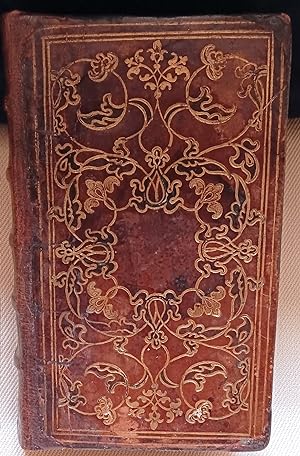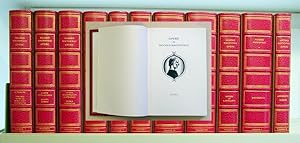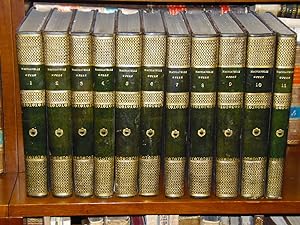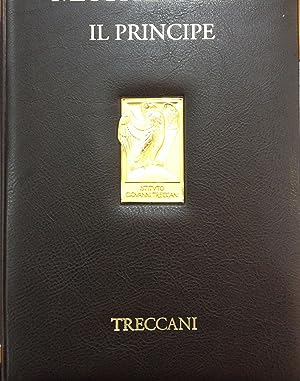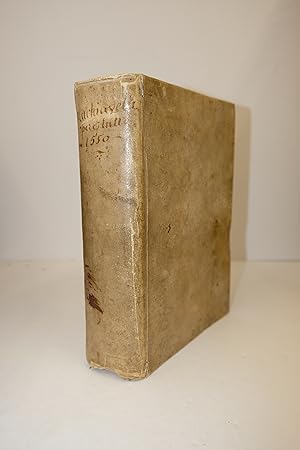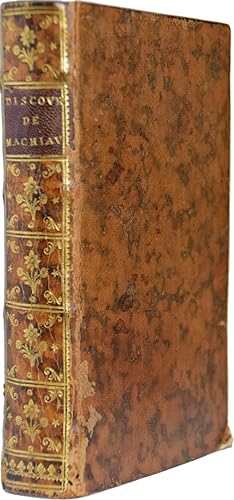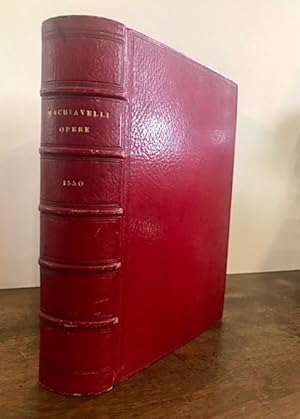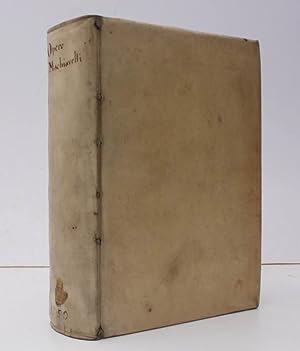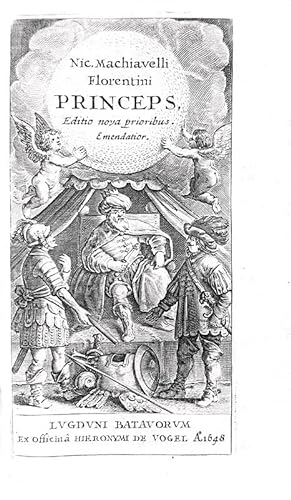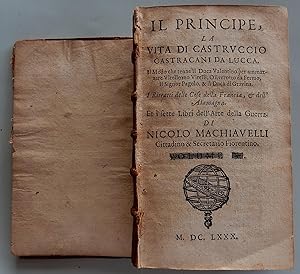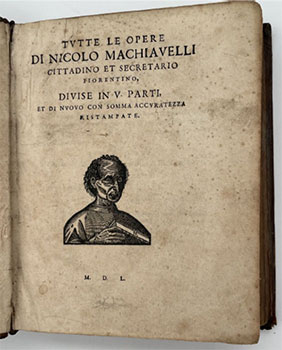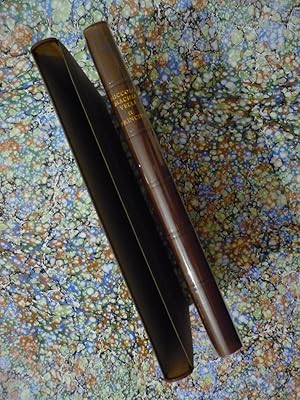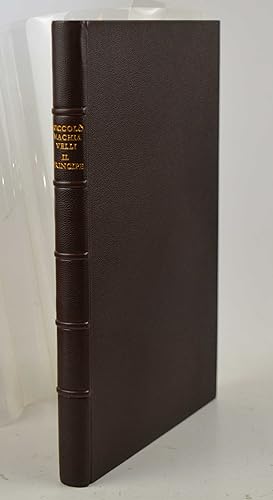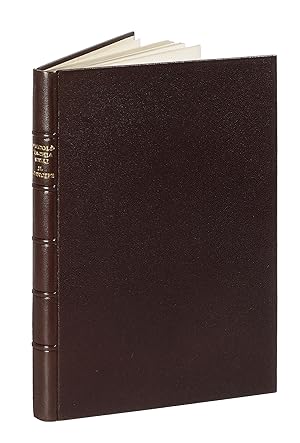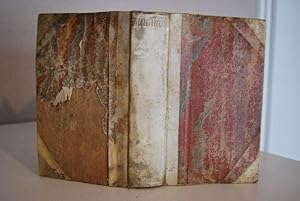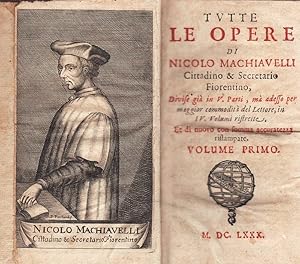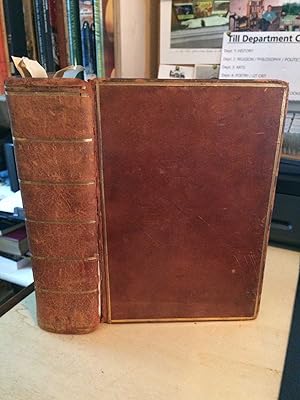machiavelli, il principe (562 risultati)
Tipo di articolo
- Tutti gli articoli
- Libri (561)
- Riviste e Giornali
- Fumetti
- Spartiti
- Arte, Stampe e Poster (1)
- Fotografie
- Mappe
-
Manoscritti e
Collezionismo cartaceo
Condizioni
Legatura
Ulteriori caratteristiche
Spedizione gratuita
Paese del venditore
Valutazione venditore
-
Libellus de his: quae ab optimis principibus agenda sunt: ad Ludovicu[m] atque Elveria[m] Ferdinandos a Corduba Principes Suessanos.
Editore: Florence: Filippo Giunta, 1521, 1521
Da: Peter Harrington. ABA/ ILAB., London, Regno Unito
Scarce first edition of this treatise on the behaviours of the best princes. It was conceived as an "immediate and deliberate reaction" (Dionisotti, p. 133) to Machiavelli's masterpiece, then circulating in manuscript. It paved the way for Nifo's later De regnandi peritia (1523), the earliest plagiarism of The Prince. A prominent philosopher, Agostino Nifo (c.1469-1538) entered the Medici's circle before Machiavelli. The success of his De immortalitate animae (1516) gained him the favour of Pope Leo X (Giovanni di Lorenzo de' Medici), who appointed him count palatinate in 1919 and authorized him to add the Medici surname to his own. Towards the end of 1520, "the wide dissemination of Machiavelli's treatise, preceded by a dedication to Lorenzo and concluded by an exhortatio addressed to the 'illustre Casa' Medici, should. have caused concern to the hegemonic family, causing them to run for cover and quickly commission a kind of 'anti-Il principe'. Nifo would have been chosen because the Campanian philosopher, besides enjoying an excellent repuation amongst academic and humanist circles, was also closely linked to the Medici. and was well known for his versatility and speed in writing" (Bausi, p. 101). Libellus de his: quae ab optimis principibus agenda sunt ("Little book on the things that must be done by the best princes") is an example of the traditional "speculum principis" genre, describing the ideal qualities of the best ruler on the basis of ancient sources. It has been described as "il rovescio del Principe" ("an antithesis of The Prince", Dionisotti, p. 133) as "several chapters in the Libellus, whilst describing the usual image of the honest, virtuous prince, are frontally opposed to the corresponding chapters in Machiavelli's treatise as regards such subjects as the prince's religion, his liberality, keeping his word, and his piety. In short, a kind of counterpoint to the most 'daring' section of Il principe, formed by chapters XV-XIX, as well as chapter VII, with its 'scandalous' praise of Cesare Borgia" (Bausi, p. 100-1). Nifo subsequently decided to expose his anti-Machiavellian ideas in more detail in De regnandi peritia, translating into Latin and paraphrasing large portions of the still unpublished The Prince, and framing them within a more traditional and Aristotelian ethical perspective. This work is scarce in commerce, with only four copies recorded at auction. EDIT16 CNCE 55289; Renouard, Héritiers de Filippo Junta 42; USTC 844668. Francesco Bausi, "Philology, history and critical reception. The first readers of Il principe", in Problematising Il principe, 2017; Carlo Dionisotti, Machiavellerie, 1980. Small quarto (208 x 150 mm). Modern French curl pattern marbled paper boards, early manuscript title on top edge. Woodcut printer's device on verso of last leaf. Small Milan bookseller's ticket on front pastedown. Occasional foxing, small stain to outer margin of final gathering, paper repair to lower margin of leaf C4 and upper corner of last leaf. A notably bright, crisp and well-margined copy.
-
The Florentine Historie. Written in the Italian tongue, by Nicholo Macchiavelli, Citizen and Secretarie of Florence. And translated into English by Thomas Bedingfield Esquire.
Editore: Printed by T. C. [Thomas Creede] for W. P. [William Ponsonby], London, 1595
Da: Raptis Rare Books, Palm Beach, FL, U.S.A.
Prima edizione
Rare first edition in English of this classic work. Quarto, bound in full calf, decorated with woodcut engraved ornamental title page and engraved head and tailpieces. In near fine condition with some light browning and wear, title trimmed and laid down. Translated by Thomas Bedingfeld. First editions are scarce, especially in this condition. Florentine Histories is a historical account by Italian Renaissance political philosopher and writer Niccolà Machiavelli. After the crisis of 1513, with arrests for conspiracy, torture and after being sentenced to house arrest, Machiavelli's relationship with the Medici family passively began to mend itself. If the dedication of Il Principe (1513) to Lorenzo II de' Medici had not any effect, part of the then dominant faction of the Florence was not against him, and instead granted him an appointment. In his letter he deplores of his idle state, offering his precious political experience to the new lord. To sustain that timid request Machiavelli, with a considerably courtier-like spirit, set his Mandragola for the wedding of Lorenzino de' Medici. In 1520, he was invited to Lucca for a mission of a semiprivate character, indicating that the ostracism was to be raised up. At the end of that year, Giulio Cardinal de Medici commissioned him to write a History of Florence. Although this was not exactly the charge he desired, Machiavelli accepted it as the only possible way to come back into the graces of the Medici. The intent of the work, although semi-officially, was to recover the city's charge of historic officiality. The wage for the appointment was not large (57 florins per year, later increased to 100). The finished work was presented officially to Giulio de' Medici, now Pope Clement VII, in the May 1526. The Pope liked the work and rewarded him, albeit moderately, and asked him support in the creation of a national army, on the wake of his theorical work The Art of War, in the preparations for the War of the League of Cognac. However, after the Sack of Rome (1527) and the fall of the Medici government in Florence, Machiavelli's hopes were dashed. Machiavelli would die soon afterwards.
-
The Florentine History in VIII Books.
Editore: Printed for Charles Harper, and John Amery, London, 1674
Da: Raptis Rare Books, Palm Beach, FL, U.S.A.
Prima edizione
Rare second edition in English of Machiavelli's Florentine History, the first edition to appear after Thomas Bedingfield's version in 1595. Octavo, bound in full morroco with gilt titles and tooling to the spine in five compartments within raised gilt bands, quadruple gilt ruling and cornerpieces to the front and rear panels, gilt turn-ins. In near fine condition with occasional spotting. Ownership names to the front free endpaper and title page. Scarce in commerce. First published posthumously in 1532, Machiavelli's Florentine History was commissioned by Giulio de' Medici, later Pope Clement VII, not as a eulogy of the Republic of Florence of which Machiavelli had been titled "il segretario", but as glorification of the Medici family. After the crisis of 1513, with arrests for conspiracy, torture and after being sentenced to house arrest, Machiavelli's relationship with the Medici family passively began to mend itself. If the dedication of Il Principe (1513) to Lorenzo II de' Medici had not any effect, part of the then dominant faction of Florence was not against him, and instead granted him an appointment. The first of the eight books presents a general history of the fall of the Western Roman Empire to the beginning of the 15th century; books II, III and IV present the history of Florence before the Medici rise; and the final four books speak to the fight for power that ended with the Medicean lordship, closing with he death of Lorenzo il Magnifico.
-
Machiavels Prins, med Undersökningen deraf. Öfversatt ifrån Hufvudspråken. - [THE FIRST SCANDINAVIAN EDITION OF "THE PRINCE" - POSSIBLY THE RAREST MACHIAVELLI-TRANSLATION]
Da: Lynge & Søn ILAB-ABF, Copenhagen, Danimarca
Membro dell'associazione: ILAB
Prima edizione
Stockholm, Grefing, 1757. Small 8vo. In the original blank wrappers. Dampstain to upper part of spine and upper part of back wrapper, affecting last blank leaf. Old owner's name to title-page. First blank leaf with comments in recent hand in pencil. From the library of Swedish crime author Henning Mankell. Text printed in two columns. Title-page with lovely engraved vignette, depicting a putti with a spyglass (symbolising the Enlightenment) and lovely woodcut vignettes. Untouched and unrestored in completely original condition. A magnificent copy. (16), 256 pp. Exceedingly scarce first edition of the first Scandinavian translation of Machiavelli's "Il Principe", namely the first Swedish translation. Through its Scandinavian translation, the work came to have an immense impact on Scandinavian politics and philosophy and was considered a breakthrough work of political thought, albeit highly controversial and not at all acceptable at the time. Even though antedating some other European versions by more than two centuries, the first translation into a Nordic language came to signify substantial changes in the political climate of the Nordic countries and sparked a debate that was to last another century, until Machavelli was finally accepted in the North. "The Prince" was not to be translated in Scandinavia until more than two centuries later, partly because in the meantime it could be read in Latin - in the versions of Tegli, Conring and Langenhert - and later in French, but also because at that time a work which established, among other things, the superiority of the Reason of State to moral values was unacceptable, at least formally. The first translation of "The Prince" into a Nordic language is by Carl von Klingenberg, together with the translation of "The Anti-Machiavel" by Frederick II of Prussia ("Machiavels Prins, med Undersökningen deraf. Öfversatt ifrån Hufvudspråken", Grefing 1757).Klingenberg's work, however, remained an isolated fact for more than a century. Actually "The Prince" as a separate work, was translated only in 1867 by Rudolf August Helfrid Afzelius?" by that time the debate over Machiavelli had been settled, and the value of "The Prince" finally Acknowledged. The first Danish translation of the whole work dates back to only 1876.Therefore the first Scandinavian translation of "The Prince" was completed in Sweden around the middle of the eighteenth century, during the "frihetstid" (The "Age of Liberty", 1721-72), a period full of political, social and cultural turmoil: These are the years of the making of a political conscience and of the spread of new political theories, of the development of rhetoric, of the foundation of reviews and literary associations, as well as of scientific and cultural academies" these years marked a new openness to foreign cultures and the diffusion of Enlightenment ideas. The "Age of Liberty" is also a period full of political and cultural conflicts and uncertainty." (Roberto de Pol, pp. 248-250). "The Prince" constitutes the beginning of modern political philosophy and one of the most influential works in the history of modern thought. It founded the science of modern politics on the study of mankind, and even today no political thinker can disregard the importance of this masterpiece of political theory. For more information about the first Scandinavian translation and about the translator, see: Roberto de Pol: The First Translations of Machiavelli's "Prince", pp. (247-278). The work is of the utmost scarcity and we have been able to locate no more than three copies of it world-wide: 1: National Library of Sweden" 2: National Library of Denmark 3: Brown University (the Machiavelli Collection). This makes it one if the very scarcest Machiavelli-translations in the world.
-
Discourses. Upon the first Decade of T. Livius translated out of the Italian; With some marginall animadversions noting and taxing his errours. By E[dward]. D[acres].
Editore: London: printed by Thomas Paine for William Hills and Daniel Pakeman, 1636, 1636
Da: Peter Harrington. ABA/ ILAB., London, Regno Unito
Prima edizione
First edition in English of Machiavelli's Discorsi, first published in Italian in 1531 and offering a far fuller and more sustained treatise of political analysis than the much better known, but far shorter, Il Principe. In 1640 the translator Edward Dacres also published the first English translation of Il Principe."Overall, [Dacres's] translations of Machiavelli are deserving of their classic status, combining precision with an austere vigour of expression, and rising to the challenge of the more rhetorically heightened passages of the originals in a manner that has rarely been bettered" (France, p. 484). Dacres is a shadowy figure of whom little appears to be known, but it seems that he translated and published the works with the aim of advancing Machiavelli's reputation, covering himself here with the "animadversions noting and taxing his errours", which in fact do little to interfere with the work, unlike the later translations of Henry Neville and Ellis Farneworth. Modern scholarship tends to agree that the Discorsi and Il Principe should be read in tandem, the two works complementing rather than contradicting each other. "From a comparative reading, one must come to the startling conclusion that Machiavelli was a convinced republican. He had no liking for despotism, and considered a combination of popular and monarchical government best. No ruler was safe without the favor of his people. The most stable states are those ruled by princes checked by constitutional limitations. His ideal government was the old Roman republic, and he constantly harked back to it in the Discourses" (ibid., p. 27). ESTC S109049; STC 17160 (noting two variants of the title, with no precedence between them: in the present variant, the word "animadversions" is printed in italic; in the other, it is printed in roman). Robert Bingham Downs, Books that Changed the World, 1956; Peter France, ed., The Oxford Guide to Literature in English Translation, 2001. Duodecimo (144 x 80 mm). Contemporary calf, rebacked with new red morocco label. Bound without initial and terminal blanks, leaf B1 cancelled as usual with the correct text printed on preceding a11-12. Extremities restored. Contents lightly browned, a few spill burns and ink splashes (larger splash to p. 551). A very good copy.
-
Il Principe (Barb. lat. 5093). (Codices e vaticanis selecti.Series maior) [2 volume set]
Editore: Istituto della Enciclopedia italiana fondata da Giovanni Treccani ; Biblioteca apostolica Vaticana, [Roma], [Città del Vaticano], 2013
ISBN 10: 8821009041ISBN 13: 9788821009044
Da: Joseph Burridge Books, Chadwell Heath, Regno Unito
Libro
Hardcover. Condizione: New. 287 pages, illustrations : 25 cm. 2 volume set : I. [Facsimile] ‒ II. Il principe. Testo e saggi. Coedizione: Istituto della Enciclopedia Italiana fondata da Giovanni Treccani. text in Italian.
-
Tutte le opere . . . divise in V. parti et di nuovo con somma accuratezza ristampate. (bound with) De vanitate consiliorum liber unus, in quo vanitas et veritas, rerum humanarum politicis & moralibus rationibus clare demonstratur & dialogice exhibetur; (bound with) Libri tres de origine urbium earum excellentia et augendi ratione quibus accesserunt Hippolyti a collibus incrementa urbium sive de causis magnitudinis urbium liber unus
Editore: n.p., Florence, 1700
Da: B & L Rootenberg Rare Books, ABAA, Sherman Oaks, CA, U.S.A.
Edizione Testina. Vignette of Machiavelli's portrait on title. Separate dated title pages to all parts except the Historie fiorentine which begins the volume. Dell'arte della guerra contains typographical figures depicting military formations and a double-page woodcut illustration depicting an army camp, and a manuscript table of contents following L'asino d'oro. Contemporary half vellum and marbled boards, manuscript titles on spine. Despite some browning and damp-staining, an excellent copy with an ownership inscription dated 1801 on the paste-down. I. Early edition of the political works of Machiavelli, which include: --Gli otto libri delle Historie Fiorentine. --Discorsi di Nicolo Machiavelli cittadino et secretario fiorentino, sopra la prima deca di T. Livio a Zanobi Buondelmonti et a Cosimo Rucellai. --I sette libri dell'arte della guerra di Nicolo Machiavelli cittadino et secretario fiorentino. --L'asino d'oro di Nicolo Machiavelli cittadino et secretario fiorentino, con tutte l'altre sue operette: La contenenza delle quali haurai nella seguente carta. --Il principe di Nicolo Machiavelli al magnifico Lorenzo di Piero de Medici. La vita di Castruccio Castracani. Il modo che tenne il Duca Valentino per ammazzare Vitellozzo Vitelli, Oliveretto da Fermo, il signor Pargolo, & il Duca di Gravina. I ritratti delle cose di Francia & di Alemagna. This particular publication is called the Edizione Testina, named after the author's woodcut portrait on all the half-titles. Five variant editions are known, all showing 1550 as the (fictitious) year of printing on the title page, but which in reality are seventeenth-century forgeries. The Testina edition constitutes an interesting bibliographic case because of the particular difficulties of identification for the presence of variants, omissions and rearrangements. Machiavelli's masterpiece, Il Principe, is the work with which he "founded the science of modern politics" by analyzing Cesare Borgia's much-admired "mixture of audacity and prudence, cruelty and fraud, self-reliance and distrust of others" (PMM). Machiavelli firmly believes in the separation between politics and ethics, as each have different objects and goals. The term "Machiavellian" has come to mean a ruthlessness and immorality behavior in politics. He stated that total freedom from the religious power was the principle of a healthy State. The work was written in 1513 but was not published in Rome until 1532, five years after Machiavelli's death. Il Principe exerted an enormous influence across disciplines and nations. The work soon became a practical examination of how "power" functioned. It was first placed on the Index of Prohibited Books, in the banned absolutely category, in 1559. The list of rulers who read and used the work is very long: "Henry III and Henry IV of France were carrying copies when they were murdered; Louis XIV used the book as 'his favorite nightcap'; an annotated copy was found in Napoleon Bonaparte's coach at Waterloo." Machiavelli (1469-1527) is known as the father of modern political theory. Born in Florence, he was a diplomat for 14 years in Italy's Florentine Republic during the Medici family's exile when the city was run by Girolamo Savonarola, a Dominican friar. No official records of Machiavelli's life appear until 1498, immediately after the fall of Savonarola's government, when he would have been 29. The Florentine Republic had been reinstated, and Machiavelli was appointed as secretary of the Second Chancery, a position in which he coordinated relations with Florence's territorial possessions. As the "Florentine secretary," he had opportunities to meet and observe many of the major political figures of the period. When the Medici family returned to power in 1512, Machiavelli was dismissed and briefly jailed. II. First edition of a little known political work. Written in the form of a dialogue in twenty-five inquiries (Consultationes), in which Vanitas (Vanity) and Veritas (Truth) discuss issues concerni.
-
The Florentine Historie. Written in the Italian tongue translated into English by T. B. [Thomas Bedingfield] Esquire.
Editore: London, T.C for VV. P., 1595, London, Printed by T. C. [Thomas Creede] for W. P. [William Ponsonby], 1595., London, 1595
Da: Libreria Antiquaria Pregliasco, Torino, Italia
Condizione: molto buono. in-4 (274x176), (12), 222, buona legatura inglese seicentesca in pieno cuoio con dorso a nervetti abilmente rifatto: ai piatti cornice formata da triplice ordine di filetti, fregi floreali ai 4 angoli con iniziali ?I.O.W.?, il tutto impresso a secco; piccoli difetti agli angoli. Titolo entro elaborata bordura architettonica incisa in legno animata da personaggi sulle due colonne laterali, animali e allegorie; in basso grande medaglione racchiude un cinghiale con il motto ?Spiro non tibi? Elaborati frontalini ed inziali ornate all'inizio di ciascun capitolo. Prima edizione inglese delle Historie, che furono commissionate dalla Famiglia Medici al Machiavelli per rimediare alle vicende del 1513 ? accuse di cospirazione, tortura, arresti domiciliari - e che uscirono postume nel 1532. "The first example in Italian literature of a national biography" la definì l'Encicl. Britannica. La traduzione si deve a Thomas Bedingfield - che già aveva lavorato al De Consolatione (1542) di Cardano - e precede di quasi mezzo secolo quella del ?Principe? testimoniando la diffusione di Machiavelli nell'Inghilterra di fine Cinquecento. Le sue fortune furono condizionate dal rapporto dualistico che la Gran Bretagna ebbe con l'Italia: in un primo tempo Machiavelli era molto ammirato dalla cultura inglese come profondo pensatore e scrittore di genio; poi divenne l'incarnazione delle forze e delle dottrine cattoliche europee contro le quali stava combattendo l'emergente stato protestante inglese. Il machiavellismo influenzò la morale e la politica inglese ai tempi di Thomas More, William Shakespeare, Walter Raleigh, Francis Bacon, Thomas Hobbes e John Milton. E Nicolò diventò sinonimo di ateismo e di un modo infido di eliminare il proprio modello di ?Principe?, nonché addirittura un personaggio sul palcoscenico elisabettiano.In quest'opera "M. ha la possibilità di far parlare i protagonisti con la loro voce per persuadere o dissuadere i loro concittadini a sostenere o rifiutare una linea di condotta. Può mostrare la retorica deliberativa in azione, e far parlare gli antichi fiorentini ai fiorentini del suo tempo per esortarli con parole potenti e sagge a non imitare gli errori che hanno causato il declino della città". (Maurizio Viroli). Secondo Machiavelli, storia e storiografia erano la stessa cosa, e quest'opera ne è il miglior esempio. Dopo la crisi del 1513, con gli arresti per cospirazione e le torture, il rapporto di Machiavelli con la famiglia Medici iniziò passivamente a ricucirsi. Se la dedica de "Il Principe" (1513) a Lorenzo II de' Medici non sortì alcun effetto, una parte della fazione allora dominante a Firenze non gli si oppose e anzi gli concesse una nomina. Nella lettera deplora il suo stato di ozio, offrendo la sua preziosa esperienza politica al nuovo signore. Nel 1520 fu invitato a Lucca per una missione di carattere semiprivato, segno che l'ostracismo stava per essere sollevato. Alla fine di quell'anno, il cardinale Giulio de Medici lo incaricò di scrivere una Storia di Firenze. Sebbene questo non fosse esattamente l'incarico che desiderava, Machiavelli lo accettò come l'unico modo possibile per rientrare nelle grazie dei Medici. L'intento dell'opera era quello di recuperare la carica di ufficialità storica della città. Quest'opera non fu soltanto un'opera su commissione, ma un tributo al suo "desire to write a history that would inspire all lovers of the common good of man in whatever age or nation. The speeches he fabricated, the emotions behind the mere events he wrote about "are developed beyond dramatic requirements into expositions of social and political truths suggested by Florentine events. Incidentally, these orations enabled Machiavelli to deal with the problem of the Medici." (Allan Gilbret, Machiavelli). Tra l'altro, queste orazioni permisero a Machiavelli di affrontare il problema dei Medici". (Allan GILBRET, Machiavelli). Giulio, ora Papa Clemente VII, apprezzò il lavoro e lo r. Book.
-
Discorsi di Nicolò Machiavelli, firentino, sopra la prima deca di Tito Livio, nuovamente corretti, e con somma diligenza ristampati
Editore: In casa de' figliuoli di Aldo, Venezia, 1540
Da: Libreria Antonio Pettini, ROMA, RM, Italia
In-8°, (8), 215pp, (1), bellissima legatura francese coeva in vitello biondo riccamente decorato in oro, sui piatti una cornice di tre filetti inquadra delle sottili ed eleganti volute di filetti con rami fioriti e con foglie piene, azzurrate o vuote (alcune rilevate con pasta di cera nera o bianca). Dorso a cinque nervature abilmente rifatto, tagli dorati. Questo genere di decorazione a mano libera fu eseguito a Parigi nelle migliori botteghe che lavoravano per i più grandi bibliofili come Grolier o Maioli.Esemplare in ottimo stato e con ampi margini (alto mm 158), un insignificante piccolissimo restauro all'angolo superiore del frontespizio e un leggero alone d'umidità sulla parte inferiore del primo centinaio di fogli e sull'ultima carta.prima edizione aldina di quest'importante opera pubblicata postuma per la prima volta nel 1531, dedicata dall'autore a Zanobi Buondelmonti e a Cosimo Rucellai. I Discorsi, che si presentano come l'opera di più ampio respiro che il celebre letterato fiorentino abbia scritto, sono divisi in tre libri. Il primo concerne il problema politico 'interno', cioè l'organizzazione della repubblica, le sue leggi, ecc; il secondo tratta della politica estera; mentre il terzo abbraccia un ambito assai più vasto toccando indifferentemente questioni di politica interna, di politica estera e soprattutto argomenti militari. Il commento a Tito Livio è un pretesto preso da Machiavelli per esporre le proprie idee sulla vita dello Stato che, rispetto al Principe, si amplia grazie alla partecipazione alla vita politica del popolo e all'importanza assunta dalle leggi, dall'educazione e dalla religione.Bertelli-Innocenti 45; Renouard 120.5; Ahmanson-Murphy 263; Adams M-14; Gerber 49; Gamba 605; Graesse IV, 323; British Library, STC Italian, 400.
-
Les Discours. sur la première Décade de Tite Liue. Traduictz d'Italien en François et de nouveau reveuz et augmentez par Jacques Gohory.
Editore: printed for Robert le Magnier, 1571
Da: Blackwell's Rare Books ABA ILAB BA, Oxford, Regno Unito
with woodcut printer's device on title,woodcut initials, penultimate leaf with a woodcut portrait of Machiavelli, title-page stained, mostly as a result of the attempt to wash out an inscription, fore-edge chipped, uniformly slightly browned, ff. [viii], 179 [recte 280], [11, of 12 (lacking terminal blank), index (beginning on 280 verso), portrait], small 8vo, [bound with:] Le Prince. Dedié au magnifique Laurens fils de Pierre de Medicis. Traduict d'Italien en François auec la vie de l'auteur mesme par Jacques Gohory. [same place, printer and date], with woodcut printer's device on title, penultimate leaf of preliminaries with a woodcut portrait (the same as in the other work, here a paler impression),small stain in margin of last few leaves, ff. [8], 64, 8vo, some contemporary underlining and side notes in French, these a little cropped, somewhat rustic 19th-century ?French leather backed boards, bright marbled endpapers, red edges, extremities rubbed, the spine a little chafed. These two works were probably issued together (Brunet at any rate says so), although they seem to be universally catalogued separately. The translator Gohory is primarily important for his role in disseminating Paracelsian ideas in France, but these translations of Machiavelli were important too. 'The business of the influence and reception of Machiavelli [in England] was complicated, as we know very well, by the intervention on the Elizabethan scene of the Huguenot commentator Innocent Gentillet, who in 1576 published his Discours contre Machiavel (with a Latin translation the following year). This is the first of several early sustained attacks on Machiavelli's thinking Gentillet was responding to the horrifying Massacre of St. Bartholomew in Paris in 1572 It is quite possible that Gentillet was further influenced in his perception of Machiavellian connections in the French court by the translation of Il Principe by Jacques Gohory in 1571, the year before the massacre. Unlike previous French translations (and in a departure from his own practice in his much earlier translation of the Discorsi) Gohory refers to the Medici family in his title - doubtless a sop to Catherine (de Medici, the French queen)' (John Roe, Shakespeare and Machiavelli, Studies in Renaissance Literature 9, 2002). Rare: neither title in Adams; COPAC records 2 copies in Oxford, Bodleian (Douce copy) and All Souls, the 2 titles bound together), plus Les Discours only in the BL; Newberry and NYPL only in the US in WorldCat (both with both titles bound together); only 2 in SUDOC.
-
Niccolo Machiavelli: Tutte le Opere (11 Bde. compl.). Bd. I: Introduzioni. Il principe. Discorsi sulla prima deca di T. Livio; Bd. II: L?arte della guerra. Scritti minori; Bd. III: La vita di Castruccio Castracani. Bd. IV: Andria. La Mandragola. Clizia. Favola. Belfagor Arcidiavolo. I decennali. Dell?asino d?oro. I Capitoli. Dicorso o dialogo intorno alla nostra lingua. Canti carnascialeschi. Capitoli per una compagnia di piacere. Rime varie. Esortazione all penitenza; Bd. V: Epistolario; Bd. VI: Legazione Prima - settima. Commissaria prima-quarta; Bd. VII: Legazione ottava-diciottesima. Commissaria quinta-settima; Bd. VIII: Legazione diciannovesima - trentotessima. Commissaria ottava ? sedicesima. Bd. IX: Spedizione contro Pisa - 1499. Ribellione della Valdichiana e di Arezzo. ? 1502/1503. Spedizione dopo la Lega die Francia - 1503. Spedizione contro Pisa - 1504, 1505. Spedizione dopo la Rotta di Bartolomeo d?Alviano - 1505. Negozi e provvedimenti vari - 1499/1506. Milizia nazionale -
Editore: Stamperia Valdonega, - 82, 1968
Da: antiquariat peter petrej - Bibliopolium AG, Zürich, ZH, Svizzera
4° (29 cm), ca. 5000 Bl., etliche Holzstichillustrationen von Italo Zetti and Anna Bramanti., Violetter Maroquinband über 5 Bünde, Deckel (innen und aussen) und Rücken mit goldgeprägten Filletten verzieret. In Schmuckschuber., Nr. 326 von der Vorzugsausgabe von 550 Exemplaren. Gedruckt in der Schrift Dante von Giovanni Mardersteig, gedruckt auf hangeschöpftes Bütten der Brüder Magnani von Pescia. Die Bindearbeiten und Verzierungen wurden von Giovanni De Stefanis gefertigt.Bertelli. 40000 gr. Schlagworte: Geschichte - Renaissance, Gesamtausgaben.
-
Opere.
Editore: Luigi Mussi,, Milano,, 1810
Da: libreria antiquaria perini Sas di Perini, Verona, VR, Italia
11 voll. In 4?(310x230). Una tav. inc. in rame Mezza pelle verde con angoli dorso liscio con titolo impresso in oro e ricca bordura a merletto dorata, piatti marmorizzati. Manca il ritratto.Gamba, 630 vol. i i in 4-?Con ritralto. Edizione di soli 200 ejemplar! in Carta biana; n m Carta sptra; 8 in Carta turcbina. Prczio d^assoc. L. 140- Non si raccomanda quesla edizione che per lusso di slampa, e spezialmente per bellezza d'intaglio del ritralto premessovi, opera di Galgano Cipriani.Catalogo Gallarini, 7413. Edizione aumentata e di lusso, cÌtata nei i testi di lingua, di 200 esemplari numerati; Bertelli - Innocenzi pp. 200 - 205, n. 24. Da una lista totale dei sottoscrittori. Nr.cat: P5170040.
-
Codices e vaticanis selecti.Series maior. Istituto della Enciclopedia italiana fondata da Giovanni Treccani ; Biblioteca apostolica Vaticana, 2013. Hardcover. New. 287 pages, illustrations. 2 volume set : I. [Facsimile] II. Il principe. Testo e saggi. Coedizione: Istituto della Enciclopedia Italiana fondata da Giovanni Treccani. text in Italian.
-
Tutte le Opere di Nicolo Machiavelli, Cittadino et Secretario Fiorentino
Data di pubblicazione: 1550
Da: Librairie du Levant, Bayonne, Francia
Libro
Couverture rigide. Condizione: Bon. 1550, Sans mention d'éditeur ni de date. Édition originale des premières oeuvres complètes de Machiavel en un volume in-8, reliure plein vélin ivoire d époque, dos long, titre à la plume. Édition alla testina dont chaque partie figure un portrait sur bois de Machiavel sur la page de titre. P.1 : 3-8, 320pp - P.2 : 106pp - P.3 : [11], 280, 3-152, [2], 3-158. Une figure sur bois en double page 116-117 de l Art de la Guerre. Un ouvrage d une fraîcheur stupéfiante hormis la coiffe de queue arasée et un brunissement chimique important du texte. Dans l'histoire de l'édition des uvres de Machiavel, la Testina est d'une importance considérable. Il s'agit de l'édition - que suivra une série de réimpressions - de la première et la plus complète collection de toutes les oeuvres de Niccolo Machiavelli, citoyen et secrétaire florentin, divisée en V parties, imprimée et daté 1550, sans mention de lieu ni d éditeur. Sur la page de titre figure un portrait (d'où le nom testina, signifiant affectueusement petite tête). Si de nombreuses spéculations entourent cet ouvrage et les différentes éditions et impressions - supposée avoir eu lieu à Genève - Bartolomeo Gamba, décrit, dans sa « Serie dei testi di lingua e di altre opere importanti nella italiana letteratura scritte dal secolo XIV al XIX », les éditions d oeuvres de Machiavel faites sous la date de 1550 (chez Comino da Trino par exemple en 1541) ; les suivantes mentionnant la date de 1550 ne pouvant être que des contrefaçons du fait de la mise à l Index Librorum Prohibitorum des oeuvres de Machiavel dès 1559. De ces cinq Opere donc, seules les deux premières éditions sont celles auxquelles les amateurs doivent s attacher. L édition originale commence par un frontispice général, suivi du privilège de Clément VII à Blado et de «Tavola dell opere» ; puis viennent ensuite les différentes parties organisées comme suit : Prima parte : Delle Historie Fiorentine di Nicolo Machiavelli cittadino et secretario Fiorentino : al santissimo et beatissimo Padre Signore nostro Clemente VII. Pont. Massimo. Seconda Parte : IL principe di Nicolo Machiavelli, al Magnifico Lorenzo di Piero di Medici, La vita di Castruccio Castracani da Lvcca, IL modo che tenne iL Dvca Valentino per Ammazzare Vitellozzo Vitelli, Oliverotto da Fermo, IL Signor Pagolo, et iL Dvca di Gravina, i ritratti delle cose della Francia et della Alamagna Terza parte : Discorsi di Nicolo Machiavelli cittadino et secretario Fiorentino, sopra la prima deca di Tito Livio, a Zanobi Bvondelmonti et a Cosimo Rvcella Qvarta parte : I sette libri dell'arte della gverra, di Nicolo Machiavelli cittadino et secretario Fiorentino Qvinta parte : L'asino d'oro di Nicolo Machiavelli, cittadino et secretario Fiorentino, con tvtte l'altre sve oprette, la contenenza delle qvali havrai nella seguente carta. L édition que nous appelons la seconde a été basée sur la première, à la différence que les quatre premiers traités de la première partie ont chacun, au lieu d un faux titre, un titre particulier avec le portrait de Machiavel et la date de 1550, comme le titre général. Le portrait de Machiavel en un buste de trois quarts orienté vers la droite figure un homme au crâne chauve et au nez grossièrement aquilin, qui soutient d'une main un grand volume et jette sur le lecteur un regard froid et pénétrant, dépourvu de toute ironie, une véritable métaphore visuelle du supposé manque de scrupules du secrétaire florentin, personnage dont Diderot estimait que son génie brilla (.) dans sa manière de traiter l Histoire moderne. Il saisit, par une supériorité de génie, les vrais principes de la constitution des Etats, en démêla les ressorts avec finesse, expliqua les causes de leurs révolutions ; en un mot, il se fraya une route nouvelle et sonda toutes les profondeurs de la politique .
-
Les Discours De L'Estat De Paix et De Guerre, De Messire Nicolas Machiauelli, Secreataire & Citoyen Froentin, sur la premiere decade de Tite Liue, traduict d'Italien en Francoys
Editore: A Paris. Printed by E. Groulleau pour Iean Longis & Nober6t le Mangnyer. 1559, 1559
Da: J. Patrick McGahern Books Inc. (ABAC), Ottawa, ON, Canada
Prima edizione
Hardcover. 1st Edition. 8vo, in8's, 16.5cm, [xxiv],279,[1]p., printer's vignette on the title page and author's portrait vignette on final colophon leaf, decorated initial letters, in 18th century full mottled calf, floral gilt decorated spine panels, crushed dark crimson label, marbled endpapers, edges stained red, name crossed out in ink on the bottom title margin, a fine clean sound copy of the first French edition and the first foreign translation of any language, only one copy (this one) located in the auctions records, very rare. (cgc). No copies of this edition listed on WorldCat. Title translation: The Speeches of the State of Peace and War, Niccol di Bernardo dei Machiavelli (Italian:[nikko'l? mmakja'v?lli]; 3 May 1469 21 June 1527) was an Italian diplomat, politician, historian, philosopher, humanist, and writer of the Renaissance period.[1][2] He has often been called the father of modern political science.[3] He was for many years a senior official in the Florentine Republic, with responsibilities in diplomatic and military affairs. He also wrote comedies, carnival songs, and poetry. His personal correspondence is renowned in the Italian language. He was secretary to the Second Chancery of the Republic of Florence from 1498 to 1512, when the Medici were out of power. He wrote his most renowned work The Prince (Il Principe) in 1513. "Machiavellianism" is a widely used negative term to characterize unscrupulous politicians of the sort Machiavelli described most famously in The Prince. Machiavelli described immoral behavior, such as dishonesty and killing innocents, as being normal and effective in politics. He even seemed to endorse it in some situations. The book itself gained notoriety when some readers claimed that the author was teaching evil, and providing "evil recommendations to tyrants to help them maintain their power".[4] The term "Machiavellian" is often associated with political deceit, deviousness, and realpolitik. On the other hand, many commentators, such as Baruch Spinoza, Jean-Jacques Rousseau and Denis Diderot, have argued that Machiavelli was actually a republican, even when writing The Prince, and his writings were an inspiration to Enlightenment proponents of modern democratic political philosophy.[5][6][7] In one place, for example, he noted his admiration for the selfless Roman dictator Cincinnatus.
-
Opera Omnia. Edizione allestita per il Cinquecentenario anniversario della nascita dell'Autore (1469-1969). Il testo è stato composto in carattere Dante di Giovanni Mardesteig e impresso a Verona dalla Stamperia Valdonega su carta amano filigranata dei Fratelli Magnani di Pescia in 526 esemplari, La legatura dell'opera, in tutta pelle è stata Eseguita da Giovanni de Stefanis. PIANO DELL'OPERA: Vol. I: Il Principe Discorsi sopra prima deca di Tito Livio - Vol. II: L'arte della guerra Scritti minori - Vol. III: La vita di Castruccio Castracani Istorie fiorentine - Vol. IV: Teatro e scritti letterari - Vol. V: Epistolario - Vol. VI: Legazioni e commissarie 1 - Vol. VII: Legazioni e commissarie 2 - Vol. VIII:Legazioni e commissarie 3 - Vol. IX: Lettere di cancelleria - Vol. X: Bibliografia a cura di Sergio Bertelli e Piero Innocenti - Vol. XI: Appendice Indici a cura di Sergio Bertelli.
Editore: Valdonega 1968-1982,, 1968
Da: FIRENZELIBRI SRL, Reggello, FI, Italia
Condizione: COME NUOVO. A cura di Sergio Bertelli, ornata da incisioni in legno di italo Zetti e Anna Gregor Bramanti. Serie completa in 11 volumi, tutto il pubblicato. cm.21,5x31,5, pp.XXXIX 447; 471; 497; 445; 545; 387; 748; 694; 487; CCLXXI 501; 323; finiture in pelle e fregio al piatto anteriore. Il nostro esemplare presenta applicati in ogni volume ex libris cartacei all'ultima sguardia, il proprietario era legatore artistico di libri che realizzò le legature e questo esemplare era quello Valdonega Serie completa in 11 volumi, tutto il pubblicato. cm.21,5x31,5, pp.XXXIX 447; 471; 497; 445; 545; 387; 748; 694; 487; CCLXXI 501; 323; spledide legature in pelle con titoli e fregi dorati impressi ai dorsi con cinque nervi, tagli superiori cofanetti in cartone rigido finiture in pelle e fregio al piatto anteriore. Il nostro esemplare presenta applicati in ogni volume ex libris cartacei all'ultima sguardia, il proprietario era legatore artistico di libri che realizzò le legature e questo esemplare era quello per la sua biblioteca personale. Esemplare in barbe. spledide legature in pelle con titoli e fregi dorati impressi ai dorsi con cinque nervi, tagli superiori cofanetti in cartone rigido.
-
Tutte le Opere di Nicolo Machiavelli, Cittadino et Secretario Fiorentino, Divise gia in V. Parti,.
Editore: n/p, (Geneva), 1550
Da: Chaco 4ever Books, Montevideo, MO, Uruguay
Libro
Hardcover. Condizione: Very Good. Quarto, Five parts bound in one vols, (4), 8, 351, (4), 116, 14, 304, 168, 170, (1) pp, ), a-z4, aa-pp4, aaa-xxx4, aaaa-xxx4, yyy2 .1550 (but c1610 -1620) with engraved portrait of Machiavelli, including Index and Privilege of the Clemente VII, The first part: Historia Fiorentine. Second part: II Principe. La vita di Castruccio Castracani. Il modo che tenne il Duca Valentino. I ritratti delle cose di Francia e di Alamagna. Third part: Discorsi sopra la prima Deca di Tito Livio. Fourth part: Dell arte della guerra. Fifth part: L Asino d oro. many of Maquiavelo's works had a false press tail, possibly due to political matters. Gamba 623 in 3 pages it describes 5 copies with some differences between them, one of them has the inscription in the frontispiece: In Gineva per Pietro Aubert. Brunet ,III, 1274. Bound in full old vellum, spine label. Ex libris Marcellus Schlimovich. Age toned but very good copy. Brunet, III, 1274.
-
Tutte le opere di Nicolo Machiavelli cittadino et secretario fiorentino, divise in V. Parti, et di nuovo con somma accuratezza ristampate
Editore: s.t. 1550 (ma 1610-1619 ca.), s.l. (Ginevra?), 1550
Da: Libreria Ex Libris ALAI-ILAB/LILA member, Roma, Italia
Elegante legatura in marocchino rosso con nervi e titolo impresso in oro al ds. (firmata Duru 1847). Tagli dorati. Pur con la mancanza segnalata di alcune carte, esemplare in ottimo stato di conservazione, freschissimo e totalmente privo di fioriture e bruniture. Famosa edizione c.d. della Testina per le ripetute piccole immagini del busto dell Autore sui diversi frontespizi. Le opere contenute sono: Le Historie fiorentine, Il Principe, La Vita di Castruccio Castracani, I Ritratti delle cose di Francia et della Alamagna, Discorsi sopra la prima deca di Tito Livio, I sette Libri dell Arte della guerra, L Asino d oro, Clizia e Mandragola. Cfr. Bertelli S.-Innocenti P., Bibliografia machiavelliana, n. 20; Gamba, 623. 4to (cm. 21,3), 2 cc.nn., 441(1) pp., 4 cc.nn., 140 pp., 14 pp., 1 c.nn. bianca, 364 pp. (i.e. 362), 1 c.nn. bianca, 185(1) pp., 3 cc.nn. (di 7, assente la segnatura 2b4) con alcuni diagrammi n.t., (assenti 2 cc.nn., segnatura pi greco2), 189(1) pp., 1 c.nn. bianca. Oltre al frontespizio generale, sono presenti altri quattro frontespizi ognuno con il ritratto di Machiavelli in xilografia.
-
Tutte le Opere di Nicolo Machiavelli cittadino et secretario fiorentino. Divise in V. Parti et di nuovo con somma accuratezza ristampate al santissimo et beatissimo Padre Signore Nostro Clemente VII. THE SINCLAIR 'TESTINA' MACHIAVELLI IN CONTEMPORARY VELLUM
Editore: [Geneva], 1550 [c.1610-1639], 1550
Da: Island Books, Thakeham, West Sussex, Regno Unito
5 parts in 1 vol., 8vo., text in Italian, with fine engraved woodcut portrait of the author on title; contemporary full vellum, backstrip lettered and dated in MS with Sinclair family stamp in gilt, yapped fore-edges, blue sprinkled edges, some light and largely uniform age-stoning else a remarkably bright, clean, crisp copy. A SINCLAIR FAMILY COPY OF THE 'TESTINA' MACHIAVELLI, WITH FINE NINETEENTH CENTURY ENGRAVED ARMORIAL FAMILY BOOKPLATE ON FRONT PASTE-DOWN, MS SIGNATURE 'SINCLAIR' ON TITLE, AND FAMILY CREST WITH MOTTO STAMPED IN GILT ON BACKSTRIP. The bookplate carries the Sinclair press-mark in MS and the front paste-down several (cancelled) earlier press-marks. With a nineteenth century bookseller's printed cataloguing mounted facing front free endpaper. The collection comprises: Part I: Historie Fiorentine; Part II: Il Principe. La vita di Castruccio Castracani. Il modo che tenne il Duca Valentino per ammazzare Vitellozzo Vitelli. I ritratti delle cose di Francia e di Alamagna; Part III: Discorsi sopra la prima Deca di Tito Livio; Part IV: Dell'arte della Guerra; Part V: L'Asino d'oro. With the Index and Privilege of Clemente VII. The dating is false; several editions of Machiavelli carry nominally earlier dates following their proscription by the Pope in the 1550s. General James St. Clair-Erskine, 2nd Earl of Rosslyn (1762-1837) was educated at Edinburgh High School and Eton, and commissioned in 21st Light Dragoons (one of the several early manifestations of the regiment; disbanded 1783) after which he pursued a distinguished military and political career. He succeeded his uncle to the Earldom in 1805, and was in the following year a member of the Mission to Lisbon which resulted in Wellington's Peninsular Campaign. He was appointed General in 1814, Lord Privy Seal (1829-30) and Lord President of the Council under Peel (1934-5). The Geneva 'testina' editions take their name from the 'little head' of the author carried on titles. Brunet, III, 1274; Gamba 623 (recording several variant printings).
-
Princeps aliaque nonnulla ex italico latine nunc demum partim versa, partim infinitis locis sensus melioris ergo castigata curante Hermanno Conringio
Editore: Typis atque impensis Henningi Mulleri, Helmestadii, 1660
Da: Libreria Ex Libris ALAI-ILAB/LILA member, Roma, Italia
Prima edizione
Legatura inizi 700 in piena pelle con nervi, ricchi fregi e titolo oro al dorso. Al centro del piatto anteriore uno stemma araldico impresso in oro. Tagli rossi. Una piccola fenditura alla cerniera del piatto posteriore e altre minime tracce d usura, ma ottimo esemplare nel complesso. Il volume raccoglie tre rare opere, tutte in prima edizione. L Autore, uno tra i maggiori intellettuali tedeschi del XVII secolo, ebbe l indubbio merito di far meglio conoscere al mondo culturale alemanno - attraverso la traduzione in lingua latina del Principe e le osservazioni critiche scritte sulla medesima - l opera dell illustre fiorentino. Così come, in un campo del tutto diverso - ma del quale il Conring era altrettanto esperto - aveva avuto modo di divulgare le teorie di Harvey sulla circolazione del sangue. Si noti che queste tre opere di Hermann Conring sono pressoché assenti nelle biblioteche italiane (cfr. la catalogazione ICCU). 4to (cm. 20), 47(3) pp., 110 pp., 1 c.nn., 32 pp., 1 c.nn., 8 pp., 1 c.nn., 6 pp.,1 c.nn., 16 pp., 1 c.nn. (segue) Hermanni Conringii Animadversiones politicae in Nicolai Machiavelli librum de Principe, Ibidem 1661, 8 cc.nn., 218 pp., 4 cc.nn. (segue) Epistolae hactenus sparsim editae, nunc uno volumine comprehensae, Ibidem 1666, 8 cc.nn., 480 pp., 2 cc.nn.
-
Princeps ex Sylvestri Telii Fulginatis traductione diligenter emendatus- Quibus denuo accessit Antonii Possevini Iudicius de Nicolai Machiavelli et Ioannis Bodinis scriptis.Lugduni Batavorum, ex Officina Hieronymi De Vogel, 1648.
Editore: Lugduni Batavorum, ex Officina Hieronymi De Vogel, Lugduni Batavorum, 1648
Da: Studio Bibliografico Apuleio, Trento, Italia
Condizione: Buono (Good). 0. Pp. 448 (12). Preceduto da: MACHIAVELLI NICOLÃ . Disputationum de republica, quas discursus nuncupavit, libri III. Quomodo in rebuspub. ad antiquorum romanorum imitationem actiones omnes bene maleve instituantur. Ex italico latini facti. Lugduni Batavorum, apud Petrum Leffen, 1649. Cm. 14,5, pp. 432. Due opere in un volume di cm. 13,5. Bellissime antiporte incise finemente in rame. Ottima legatura strettamente coeva in piena pergamena con unghie e titoli ms. al dorso. Sporadiche e lievi arrossature. Esemplare fresco e ben conservato. Prima opera: Interessantissima edizione che presenta una significativa traduzione latina del Principe di Machiavelli, destinata ad una circolazione europea del trattato. Seguono il Principe queste opere: Possevino, Iudicium de Nicolai Machiavelli et Ioannis Bodini (pp. 157-210). Vindiciae contra tyrannos sive, de principis in popolum, populique in principem, legitima potestate. Stephano Iunio Bruto Celta, auctore (pp. 211-374). De iure magistratuum in subditos, et officio subditorum erga magistratus (pp. 375-448). Cfr. Bertelli-Innocenti, Bibliografia machiavelliana, p. 105; Willems, nr. 1649; Iccu. Seconda opera: Importante traduzione latina, destinata alla circolazione europea, dei Discorsi sopra la prima deca di Tito Livio, vero e proprio capolavoro della scienza politica cinquecentesca. Non comune. Cfr Cfr. Bertelli-Innocenti, Bibliografia machiavelliana, p. 105; Willems, nr. 1656; Iccu. . . . . . . 0. . Book.
-
1720 Works of Famous Nicholas Machiavelli - Including The Prince - Fine Binding
Editore: A. Churchill, et al, 1720
Da: ROBIN RARE BOOKS at the Midtown Scholar, Harrisburg, PA, U.S.A.
Libro
Hardcover. Condizione: Fair. 3rd Edition. The Works of the Famous Nicholas Machiavel, Citizen and Secretary of Florence. Written Originally in Italian, and from thence newly and faithfully Translated into English. The Third Edition, carefully Corrected. London: Printed by T. W. for A. Churchill, R. Bonwick, T. Goodwin, J. Walthoe, M. Wotton, S. Manship, B. Tooke, R. Wilkin, R. Smith, R. Robinson, and T. Ward. 1720, 543 pp, Finely bound in modern & signed binding by R. Carlton Seitz. 12.5 x 8", quarto. Includes: 1. The History of Florence, 2. The Prince, 3. The Original of the Guelf and Ghibiline Factions, 4. The Life of Castruccio Castracani, 5. The Murther of Vitelli, &c. by Duke Valentino, 6. The State of France, 7. The State of Germany, 8. The Discourses on Titus Livius, 9. The Art of War, 10. The Marriage of Belphegor, & 11. Nicholas Machiavel's Letter in Vindication of himself and his Writings. In fair condition. Modern binding very attractive & presentable. Boards are rubbed at edges and leather corners. Tea-staining exhibited on marbled paper deco at bottom of front board. Gilt lettering on leather spine bright and clean. Glue residue exhibited on modern front paste-down. Binder's ink stamp found on bottom corner of modern front end-page (verso). Title page reinforced with fresh paper. Front gutter split at contents page with exposed binding. Previous ownership signature found on title page: T. Holt White. Manuscript writing found on blank side (verso) of title page. Original end-pages are detached from binding, but included & full of manuscript writing by (presumed) T. Holt White. Some light foxing through preliminary pages; some instances of age-staining. Page 543 reinforced with fresh paper & is chipped along edges. Modern binding intact - front gutter split. Please see photos and ask questions, if any, before purchasing. Niccolò di Bernardo dei Machiavelli (1469-1527) was a Florentine diplomat, author, philosopher and historian who lived during the Renaissance. He is best known for his political treatise The Prince (Il Principe), written around 1513 but not published until 1532, five years after his death. He has often been called the father of modern political philosophy and political science. After his death, Machiavelli's name came to evoke unscrupulous acts of the sort he advised most famously in his work, The Prince. He claimed that his experience and reading of history showed him that politics have always been played with deception, treachery and crime. He also notably said that a ruler who is establishing a kingdom or a republic, and is criticized for his deeds, including violence, should be excused when the intention and the result are beneficial to him. The Prince has been surrounded by controversy since it was first published. Some consider it to be a straightforward description of political reality. Others view it as a manual, teaching would-be tyrants how they should seize and maintain power. While much less well known than The Prince, the Discourses on Livy has been said to have paved the way for modern republicanism. His works were a major influence on Enlightenment authors who revived interest in classical republicanism, such as Jean-Jaques Rousseau and James Harrington. This is a Third Edition - the first being published in 1675. The unnamed translator was Henry Neville (1620-1694), a political and miscellaneous writer and a Republican opponent of Oliver Cromwell, who was much admired by Hobbes for his Plato Redivivus, or a Dialogue Concerning Government (1681). An attractive work containing Machiavelli's most famous works, including The Prince. RAREB1720NUVQ 04/24 - HK1405.
-
Il Principe, La Vita Di Castruccio Castracani da Lucca. Volumes III and IV bound together.
Editore: No place or printer, M.DC.LXXX. 1680., 1680
Da: The Bookstall, Richmond, CA, U.S.A.
Prima edizione
Hardcover. Condizione: Good. 1st Edition. SOLD AS IS. Original leather binding, 3 1/4 x 5 7/8 inches. Covers detatched, but present. Marbled free end paper and first blank page detatched, but present. (1)2-3,(4) 1-271. Followed by "I Sette Libri Dell' Arte Della Guerra Di Nicolo Machiavelli, Cittadino & Secretario Fiorentino. (2)3-364.this section containing 8 folding charts. The 8th chart is tattered and split on all folds but whole (see photo). Followed by Volume IV: L'Asino D'Oro Di Nicolo Machiavelli Cittadino & Secretario Fiorentino, Con Tutte l'altre sue Operette: Il Contenuto delle quali havrai nella seguente Carta. (2)3-317. The two title pages feature a globe made of bars of longitude and latitude. Text block Very good. SOLD AS IS with covers detatched.
-
Tutte le opere de Nicolo Machiavelli, cittadino et secretario Fiorentino, divise in V. parti, et di nuove con somma accuratezza reitampate. First edition.
Editore: [Geneva: Pietro Alberto], 1550
Da: Wittenborn Art Books, San Francisco, CA, U.S.A.
Condizione: Good. Small 4to. 16.5 x 21.3. Full ca. 17th Century calf. [2], 352, [4], 116,14, [2], 304, 168, 168 (of 170) pp. . Brunet, 1274; OCLC Number 634849447.Chapters: 1. Gli otto libri delle Historie fiorentine;2. Il principe. La vita di Castruccio Castracani. Il modo che tenne il Duca Valentino per ammazzare Vitellozzo Vitelli, Oliueretto da Fermo, il Signor Pagolo, & il Duca di Grauina. I ritratti delle cose di Francia & di Alamagna;3. I tre libri de' Discorsi sopra la prima deca di Tito Liuio;4. I sette libri dell'arte della guerra;5. L'asino d'oro. Quattro capitoli in rima; terza; cioè, dell'occasione, della fortuna, dell'ingratitudine, & dell'ambitione. Duoi decennali in rima terza; cioè, un compendio delle cose fatte in venti anni in Italia. Due comedie, la Mandragola, & la Clitia.Fort volume petit in-4 veau marbré, encadrement de double filet doré sur les plats, dos à nerfs, caissons et fleurons dorés (Reliure ancienne) ; (2) ff. dont titre, 351 pp. - (2) ff., 116 pp. - 304 pp. - 168 pp. - 168/170 pp. [manquent pp. 169 et 170]. Début de fente aux mors, 3 coins émoussés avec manques de cuir, rousseurs et feuillets brunis. PREMIÈRE ÉDITION des éditions genevoises dites « de la petite tête » ou della testina, nommées ainsi en raison de la présence au feuillet de titre général d'un portrait de Machiavel en buste tenant un livre à la main, gravé sur bois. Cette édition XVIe en langue italienne des oeuvres de Machiavel contient 5 parties distinctes. SÉDUISANT EXEMPLAIRE malgré le MANQUE du dernier feuillet, en reliure ancienne datant probablement du XVIIe siècle.
-
Il principe di Niccolò Machiavelli. Al Magnifico Lorenzo di Piero de' Medici (1513).Verona,Mardersteig. Stampato per Enrico Augeri, Milano,Maggio
Editore: Verona,Mardersteig, 1967
Da: La carta bianca studio bibliografico, Venezia, VE, Italia
Libro
Rilegato. Condizione: ottimo. edizione limitata. Celebre trattato politico nell'edizione critica di Federico Chabot. Tiratura di 160 esemplari numerati (1-160) su carta a tino Magnani.(Nostro n°25). Carattere Bembo corpo 16 tondo e corsivo e Griffo corpo 14 tondo maiuscolo; titolo nel frontespizio e iniziali in caratteri filettati derivati dal Pacioli stampati in azzurro. Schmoller, 148 29g.
-
Il Principe. al magnifico Lorenzo di Pietro de' Medici (1513).
Editore: Officina Bodoni per Augeri,, Verona,, 1967
Da: Studio Bibliografico Benacense, Riva del garda, Italia
Cm. 29, pp. 119 (9). Leg. edit. in piena pelle, dorso a nervi con titoli in oro. Taglio di testa dorato. Protezione in acetato. Entro custodia. Perfetta conservazione. Edizione critica di Federico Chabod. Pregiata edizione composta in carattere Bembo e stampata nel torchio a mano dell'Officina Bodoni su carta a tino di Magnani. Tiratura di 160 esemplari numerati (ns. n. 33).
-
Il Principe.Al magnifico Lorenzo di Piero de' Medici (1513).
Editore: Milano, Augeri, 1967., Milano, 1967
Da: Libreria Antiquaria Gonnelli, Firenze, FI, Italia
Condizione: Buono (Good). 0. In-4 (mm 290x195), Pagine 123, (3) con 2 carte bianche in principio e fine. Esemplare n. 3 di una tiratura di 160 esemplari su carta a tino Magnani. Legatura editoriale in pelle zigrino marrone con titoli impressi oro al dorso, unghie con filetto oro. Con custodia in cartone. Mardersteig 148. Book.
-
1.: Nic. Machiavels Regierungskunst eines Fürsten. Mit Herrn Amelots de la Houssaye historischen und politischen Anmerkungen, und dem Leben des Machiavels. 2.: Anti-Machiavel, oder Versuch einer Critik über Nic. Machiavels Regierungskunst eines Fürsten. Nach des Herrn von Voltaire Ausgabe ins Deutsche übersetzet; wobey aber die verschiedenen Lesarten und Abweichungen der ersten Haagischen, und aller andern Auflagen, angefüget worden. 3.: Historie des Anti-Machiavels. Nebst denen darüber gefällten Urtheilen. 3 Bde. in einem (komplett).
Editore: Frankfurt und Leipzig, ohne Verlagsangabe,, 1745
Da: Göppinger Antiquariat, Göppingen, Germania
Libro
397, 136 S. Einband berieben und auf der Rückseite mit ca. hälftigem Verlust des Überzugpapiers. Innen durchgehend fleckig und am Schluss wasserrandig. Handschriftlicher Besitzervermerk auf 1. Titel. Einige unscheinbare Bleistiftanstreichungen. Gutes Leseexemplar. "Antimachiavellismus ist eine Gegenströmung zum Machiavellismus, der auf die Schrift Il Principe von Niccolò Machiavelli zurückgeht. In dem Buch von Friedrich den Großen geht es wie bei Machiavelli um den Erwerb, den Ausbau und die Erhaltung von Macht in Fürstentümern. Das politische Ziel für Machiavelli ist aber eine Republik. Die Antimachiavellisten (Anhänger des Antimachiavellismus) kritisieren unter anderem die Skrupellosigkeit, die Machiavelli als Handlungsempfehlung ausgibt. Als erste Antimachiavellisten können die Jesuiten verstanden werden, die 1557 für eine päpstliche Indizierung (durch Paul IV.) der Schrift Il Principe sorgten. Der Begriff Antimachiavellismus geht zurück auf Friedrich den Großen. Dieser verfasste Anti-Machiavel, oder Versuch einer Kritik über Nic. Machiavels Regierungskunst eines Fürsten [sic], die 1740 von Voltaire herausgegeben wurde. Dort setzt sich der Freimaurer kritisch mit Machiavellis Theorie der Macht auseinander. Als Ziel formuliert der Kronprinz Ich übernehme die Verteidigung der Menschlichkeit wider diesen Unmenschen [Machiavelli], der dieselbe vernichten will; ich setze die Vernunft und die Gerechtigkeit dem Betrug und dem Laster entgegen, und ich habe es gewagt, meine Betrachtungen über Machiavels Buch von Kapitel zu Kapitel anzustellen, damit das Gegengift unmittelbar auf die Vergiftung folge." In seinen politischen Testamenten und schon im Anti-Machiavell gab Friedrich II. zu, dass dieser wohl in einigen Teilen recht habe, revidierte Machiavellis Thesen allerdings zu jederzeit und stellte ihnen ein moralisches Gegenstück entgegen. Der Antimachiavellist geht von einem prinzipiell anderen Welt- und Menschenbild aus. Während Machiavelli von einem grundsätzlich schlechten, machtgierigen, unvollkommenen Menschen ausgeht, vertritt ein Antimachiavellist eine optimistisch-humanistische Sichtweise. Dirk Hoeges geht davon aus, dass die Kritik Machiavelli verfehlt. Das gilt für die Rezeption durch die Jahrhunderte, durch Aufklärer wie Voltaire und Friedrich den Großen, der vor lauter Moral und Rechthaberei den literarischen Verstand verlor; das gilt für den Faschismus in der Person Mussolinis und für manchen selbstgerechten Demokraten. Eifern, Geifern, borniertes Moralisieren, billige Empörung, Textgestocher, Usurpation und Blütenlese auf allen Seiten; dabei ist vom Schriftsteller, Dichter und Virtuosen in Sprache und Stil nirgends die Rede. Von Machiavellis Leiden an seiner Zeit ganz zu schweigen. Die Geschichte seines Werks ist die Geschichte seiner Ausbeutung. Allen voran die Kommis der jeweiligen herrschenden Moral." Anti-Machiavel heißt ein Werk, das sich aus dem Briefwechsel zwischen Friedrich des II. von Preußen und Voltaire 1736 1740 heraus entwickelt hatte. Der damalige Kronprinz hatte im Alter von 24 Jahren mit dem Philosophen und Schriftsteller durch einen Brief vom 8. August 1736 Kontakt aufgenommen. Mit einem seiner Antwortschreiben hatte ihm Voltaire sodann einige Kapitel aus seinem Siècle de Louis XIV zur Vorablektüre zugesandt. Der Kronprinz lobte darauf den Entwurf insgesamt, aber kritisierte, dass darin Voltaire Machiavelli unter die großen Männer seiner Zeit rangiert habe. Der Kronprinz bezieht sich dabei auf den schlechten Ruf, den Machiavelli bereits erworben hatte, und den breit entwickelten Antimachiavellismus, der sich von dem in der aktuellen Politik praktizierten Machiavellismus abzuheben suchte. Als der Kronprinz im Brief vom 22. März 1739 den vagen Plan äußerte, ein Werk gegen Machiavellis Fürsten zu verfassen, bestärkte ihn Voltaire in diesem Vorhaben, weil er sich eine positive Wirkung auf die aktuelle Politik durch ein derartiges Werk eines künftigen Monarchen versprach. Der Kronprinz sandte erste Kapitel, die er entworfen hatte, Voltaire zu, von welchem er in erster Linie sprachliche Korrekturhilfe erwartete, da das Werk in französischer Sprache verfasst ward. Der Kronprinz studierte Machiavelli in einer schlechten französischen Übersetzung. Voltaire indessen schlug sodann vor, nicht jedem Kapitel ein Resumee der Ausführungen Machiavellis voranzustellen, sondern die komplette Übersetzung des Fürsten durch Amelot de la Housssaye dem Buch beizufügen. Nachdem das Werk in einer druckfertigen Form vorlag, war zunächst unklar, ob der Kronprinz es in der vorliegenden Form durch Voltaire herausgeben und veröffentlichen lassen wollte. Doch plötzlich stellt sich heraus, dass der Vater Friedrich des II. schwer erkrankt und letzterer rasch die Regierung antreten müsse. Der Kronprinz hat in dieser politischen Situation nicht mehr den Kopf frei für Buchveröffentlichungen; außerdem befürchtet er immer mehr, dass kritische Passagen seines Textes über andere Herrscher oder die Kirche diplomatische Komplikationen heraufbeschwören könnten. So überträgt er Voltaire die Aufgabe, sein Werk in Holland drucken zu lassen, und lässt ihm bei den übrigen herausgeberischen Aufgaben mehr oder weniger freie Hand. Voltaire eilt sich, diesen Wunsch zu erfüllen. Aber der Eifer stellt sich als voreilig heraus, da es schnell zu einem Bruch mit dem Verleger Jean van Duren in Den Haag kommt, der sich nicht geneigt zeigt, nachträgliche Änderungen, die sich insbesondere aufgrund politischer Bedenken des preußischen Königs ergeben, in der Druckfassung abzuändern. Voltaire sieht sich schließlich gezwungen, das dem Verleger ausgehändigte Manuskript nachträglich zu verschlechtern, und da er diese Erstveröffentlichung unter dem Titel Examen du Prince de Machiavel, avec des notes wegen des hartnäckigen Widerstands des Verlegers trotzdem nicht verhindern kann, sich davon öffentlich zu distanzieren und eine Neuauflage einer bereinigten und überarbeiteten Fassung, bei Pierre Paupie zu veranstalten, dieses Mal u.
-
Tutte le Opere di Nicolo Machiavelli Cittadino & Secretario Fiorentino, Divise già in V. Parti, mà adesso per maggior commodità del Lettore, in IV. Volumi ristrette Et di nuovo con somma accuratezza ristampate.
Editore: (Senza Editore)., (Senza Luogo)., 1680
Da: DARIS SAS, Lucca, LU, Italia
4 Voll. In-8° antico (cm 14 x 7,7), legatura in piena pelle con quattro nervi, alla francese (da restaurare), pp. (2)846 + 2 bb., (2)702 + 2 bb., (8)364 e 318 + 2 bb. In antiporta del primo volume ritratto inciso del Machiavelli, a firma P. Pinchard; titoli al frontespizio del primo volume in rosso e nero, in nero agli altri tre; al terzo volume 7 tavv. ripiegate fuori testo ad illustrare i libri dell'Arte dell Guerra. La marca tipografica - ripetuta al frontespizio di tutti i volumi - è una sfera armillare, molto simile a quella usata da Pierre Muguet, tipografo parigino, e ad altra usata da Johann Kellenaer, di Leida, entrambi operanti alla fine del XVII secolo. Le Opere sono così ripartite: I. Gli otto Libri delle Historie Fiorentine; II. I tre Libri de' Discorsi sopra la prima Deca di Tito Livio; III. Il Principe. La vita di Castruccio Castracani. Il modo che tenne il Duca Valentino per ammazzare Vitellozzo Vitelli, Oliveretto da Fermo, il Signor Pagolo, & il Duca di Gravina. I Ritratti delle cose di Francia & di Alamagna. I sette Libri dell'Arte della Guerra; IV. L'Asino d'oro. Quattro capitoli in rima terza, cioè dell'Occasione, della Fortuna, dell'Ingratitudine, & dell'Ambitione. Duoi decennali in rima terza : cioè, un compendio delle cose fatte in venti anni in Italia. Due Comedie, la Mandragola, & la Clitia. Rare leggere bruniture. Insieme molto raro, e in buone condizioni.
-
Tutte Le Opere di Nicolo Machiavelli, Divise in V Parti (5 Volumes bound as one)
Editore: No stated publisher, Geneva, 1635
Da: Dreadnought Books, Bristol, Regno Unito
Hardcover (Full Leather). Condizione: Fair. Testina Edition. Size: 8vo <9 3/4". 441 + 140 + 364 + 187 + 189pp. 5-volume set (complete). Text is in Italian. Text contains some pencil and coloured crayon markings. Otherwise pretty clean internally other than slight staining to outer margin of prelims. Front hinge cracked. Front joint split. Front board remains only loosely attached at prelim. Spine worn. Previous owner's book-plate laid in. Edges browned. Covers slightly marked and worn. Corners bumped. The publication date given above is an estimate only. The book is dated 1550 but known to be a 17th Century reproduction published under the earlier date to circumvent the Papal prohibition of 1559. Contains: 1) "Delle historie fiorentine"; 2) "Il Principe"; 3) "Discorsi"; 4) "Dell'Arte della Guerra"; 5) "L'Asino d'Oro" and other works. Portrait of Machiavelli to title page of each volume. Each individual volume title page present but no title page for the whole work. Includes one fold-out woodcut and 8 full-page typographical diagrams of troop formations. Quantity Available: 1. Shipped Weight: 1-2 kilos. Category: Philosophy; Italy; Renaissance 16thc to 17thc; Italian Language; History. Pictures of this item not already displayed here available upon request. Inventory No: 43552. This book is extra heavy, and may involve extra shipping charges to some countries.


![Immagine del venditore per Libellus de his: quae ab optimis principibus agenda sunt: ad Ludovicu[m] atque Elveria[m] Ferdinandos a Corduba Principes Suessanos. venduto da Peter Harrington. ABA/ ILAB.](https://pictures.abebooks.com/inventory/md/md31595356644.jpg)
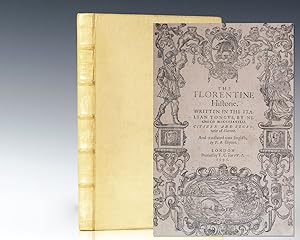
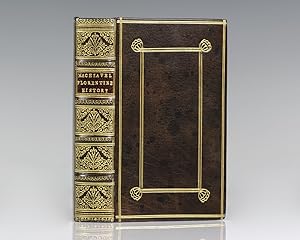
![Immagine del venditore per Machiavels Prins, med Undersökningen deraf. Öfversatt ifrån Hufvudspråken. - [THE FIRST SCANDINAVIAN EDITION OF "THE PRINCE" - POSSIBLY THE RAREST MACHIAVELLI-TRANSLATION] venduto da Lynge & Søn ILAB-ABF](https://pictures.abebooks.com/inventory/md/md30121302267.jpg)
![Immagine del venditore per Discourses. Upon the first Decade of T. Livius translated out of the Italian; With some marginall animadversions noting and taxing his errours. By E[dward]. D[acres]. venduto da Peter Harrington. ABA/ ILAB.](https://pictures.abebooks.com/inventory/md/md31803720844.jpg)
![Immagine del venditore per Il Principe (Barb. lat. 5093). (Codices e vaticanis selecti.Series maior) [2 volume set] venduto da Joseph Burridge Books](https://pictures.abebooks.com/inventory/md/md31509629468.jpg)
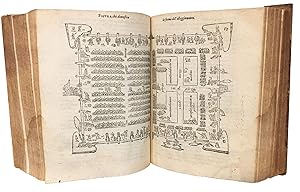
![Immagine del venditore per The Florentine Historie. Written in the Italian tongue translated into English by T. B. [Thomas Bedingfield] Esquire. venduto da Libreria Antiquaria Pregliasco](https://pictures.abebooks.com/inventory/md/md31643656976.jpg)
